Buyer Beware
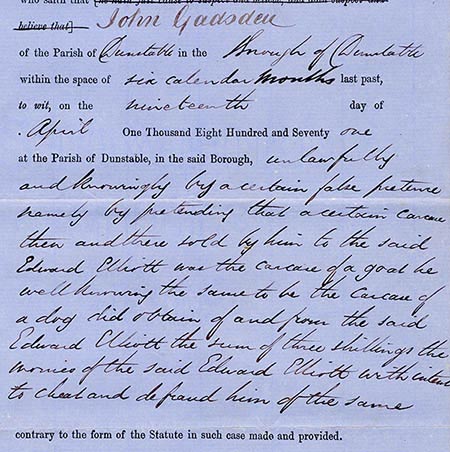
Ref: QSR1871/4/5/9
This month’s document of the month was chosen in the light of a recent news story – no prizes for guessing which one.
In 1871 John Gadsden of Dunstable found himself in court on the charge of obtaining money by false pretences by ‘pretending that a certain carcase…sold by him…was the carcase of a goat he well knowing the same to be the carcase of a dog’. [ref: QSR1871/4/5/9]
The dog in question was a black retriever called Old Sailor. On the 16th April he had made the mistake of worrying pigs at his master’s slaughterhouse and paid the ultimate price. Edward Elliott, bought the carcase from Gadsden and sold it on part to a grocer and part to his own brother-in-law. The evidence in the case hinged on whether Elliott, a butcher from Cheddington, knew that it couldn’t be a goat; a number of other butchers from the area were called to give evidence. The evidence generally was in Gadsden’s favour. He was also helped by the evidence of a police constable, Henry Tofield, who had originally told Gadsden what Old Sailor had been up to and who told the court that Gadsden had told him he had killed the dog and had shown him the carcase several days before Elliott bought it. On being confronted by Elliott, Gadsden was reported as saying that he had sold it for a lark but ‘it might turn out a linnet’.
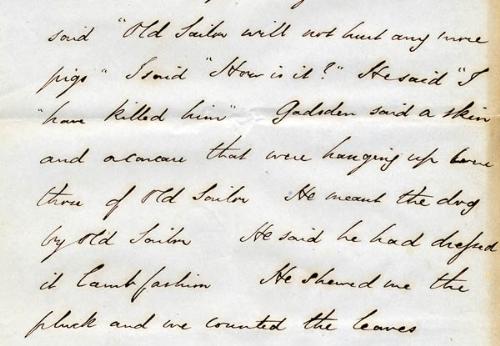
Ref: QSR1871/4/9
In the end Gadsden got off, all of the meat that could be retrieved was gathered in, refunds were given and the remains of Old Sailor were buried.
We may think of trading standards as a relatively new thing. The Trading Standards Institute only came into being in 1881 and Bedfordshire County Council only formed a Trading Standards committee in 1907 but, perhaps it is not surprising to find that from at least medieval times local authorities have appointed people to check on the quality of goods sold in their area. From the 14th century to the end of the 18th century Bedford Court Leet made annual appointments of flesh searchers, fish searchers and ale tasters [ref: BorBF11/5]. The earliest court roll dating from 1385 deals mainly with fishmongers and vintners breaking the assize.
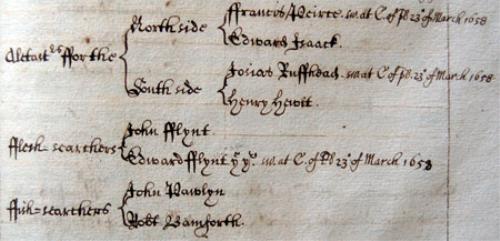
ref: BorBF11/5, 1st October 1658
While eating horse or dog meat is a cultural issue the adulteration of food with substances that are bad for people to eat is a worry for everyone. In 1818 Ebenezer Barringer was convicted at the Bedford Borough Quarter Sessions of selling bread adulterated with alum [ref: BorBF4/63/101]. In 1946 Sir Anthony Wingfield of Ampthill House wrote to his friend Sidney Matthews ‘I fear that most of the food we get is indigestible, stale and adulterated. Many seem to suffer. The new bread rationing makes housekeeping much more complicated.’ [ref: AU10/31/1/64]
Another way of making the good stuff last longer was to sell short measures. Each local authority had its own set of official weights and measures with which to check that the public was not being misled. BorBA1/26 records the receipt of a set of new standard weights and measures by the town of Bedford in 1602, and this is R M Wells with old weights and measures at Borough Weights and Measures department, Mill Street, Bedford in October 1964. [ref: BP63/10/287]
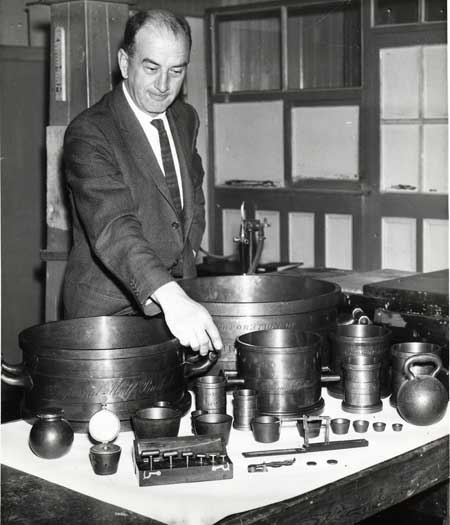
Ref: BP63/10/287
In 1869 it was reported that ‘the peculiarities of the Luton markets are such that no weighing machines are required - Straw Plait is sold by length and width and this is generally guessed at or taken I believe for granted or pretty much so. There is a Plait Superintendent who is supposed to protect the trade in Luton on behalf of the manufacturers.' [ref: BorBB11/31/19] However, things were not so trusting as this suggests and in 1874 Emma Yerrill of Cross Keys, Potton and Sarah Sells of Biggleswade were prosecuted for selling short measures of plait as part of a clamp down by the Straw Plait Dealers [ref: HF147/1/416B].
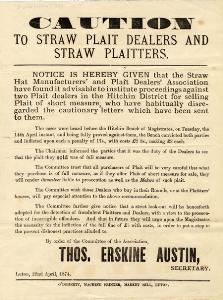
ref: HF147/1/416B for a larger version please click on the image
To finish with another case from the Paths to Crime project we look back to 1840 when William Lilley, aged 11, stole the 4 drachm, 2 drachm and 1 drachm brass standard weights from Solomon Shepherd, Inspector of Weights and Measures for Bedfordshire. William had been dismissed from Shepherd’s employ the previous day. After taking the weights he threw them in a stable dunghill, which had been removed by the time Shepherd got there to make a search. Only the 2 drachm weight was recovered 'all over horse dung'. William was sentenced to 2 days in prison and to be whipped. [ref: QSR1840/4/5/6].